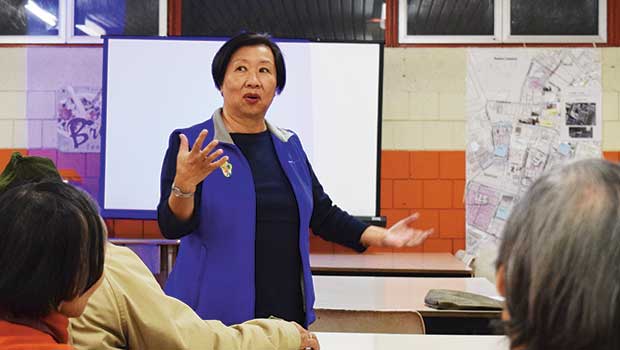Chinatown wants control of public parcel
Community requests lease from BPDA

Members of the Boston Chinatown Resident Association and the Chinatown Community Land Trust are appealing to the Boston Planning and Development Agency to take back control of a public land parcel in their neighborhood. The city-owned land, named Parcel R-1, has been leased to Tufts Shared Services for decades, with the current lease expiring at the end of this year.

Suzanne Lee, co-chair of CCLT, translates for a community meeting at Josiah Quincy School.
“Chinatown is in a severe housing crisis and land is so scarce,” said Lydia Lowe, director of CCLT. “Every parcel of public land is so precious and should be focused on the community’s needs.”
Community leaders and residents want to take over the lease for parcel R-1, which sits between Hudson and Tyler streets and is now a parking lot for Tufts Medical Center, and use the land as a potential site for affordable housing, recreation and educational space.
Last Wednesday evening, the CRA and the CCLT held a public meeting at the Josiah Quincy School to showcase their plan for the parcel and receive feedback from neighborhood residents.
BPDA officials were invited to the meeting, but did not attend. Lowe said the community organizations are hoping to meet with the BPDA in December.
According to Lowe, Tufts pays the BPDA around $175,000 a year for the parcel lease, which the BPDA then takes and applies to their operating budget.
“Tufts makes parking revenue on R-1 and five other different sites where they have parking,” said Lowe.
At Wednesday’s public meeting, Lowe noted that because Tufts University and Tufts Medical Center are nonprofits, they don’t have to pay property taxes. Instead, they participate in the PILOT program, or Payment in Lieu of Taxes, in which nonprofits in Boston choose the amount and type of contribution to give to the city. The majority of nonprofit institutions pay significantly less than the minimum contribution the city requests.
Lowe presented the plan for Parcel R-1 at the community meeting, with Chinese translation by Suzanne Lee, co-chair of CCLT. “Because the process [of building something on parcel R-1] will take several years, instead of extending the lease to Tufts we can control the income and put our foot in the door,” Lowe said.
The CCLT doesn’t intend to call on Tufts to stop parking on R-1 on Dec. 31, but “we want to continue to let Tufts employees park there, while we pay the lease and collect the parking revenue to use as an affordable housing subsidy fund,” Lowe said.
“It’s a reasonable solution for the community, and gives Tufts time to make a plan to consolidate their parking, given that they own other lots,” she added.
The CCLT partnered with two area graduate students to put together a feasibility study on how to best execute their plan and create a sustainable source of income for a community anti-displacement fund.
Alex Bob, a city planning student at MIT and Alex Rawding, an urban planning student at Harvard, found that 48.6 percent of Chinatown households make less than $50,000 per year, drawing on 2015 estimates by the U.S. Census American Community Survey.
The students also found that 60 percent of Chinatown residents spend more than 30 percent of their income on housing, which, according to the U.S. Department of Housing and Urban Development, is a cost burden.
“Market rate units are out of reach for most Chinatown residents,” said Bob.
New so-called affordable units are unattainable, as well. Using income ranges from the 2011–2015 U.S. Census American Community Survey, and rent prices of affordable apartment units at One Greenway, Bob and Rawding learned that up to $6,156 would be needed annually to subsidize a three-bedroom unit the apartment tower offers.
Bob and Rawding calculated that with 77 parking spaces in R-1, for which Tufts employees pay $270 per month per space, the CCLT would make a minimum of a $20,000 profit annually if they were to collect parking revenue, pay the lease and pay the cost of operating the lot.
Lowe said that unless the BPDA lowers its lease rate for parcel R-1, $20,000 wouldn’t be enough to subsidize apartments for residents, “but it could still be a significant amount to create a small anti-displacement fund.”
Longtime Chinatown resident Angela Soo Hoo attended last week’s community meeting, pitching in her thoughts and ideas for the public parcel. She is concerned for the future of the neighborhood because she wants to one day raise her family where she grew up. “I would like to see an indoor recreational space for the winter time,” she said. “And more three-bedroom housing.”
Many former Chinatown residents she once knew have moved out to places like Quincy or Malden to accommodate their growing families. Said Soo Hoo, “There’s lack of space in Chinatown.”


![Banner [Virtual] Art Gallery](https://baystatebanner.com/wp-content/uploads/2024/04/Cagen-Luse_Men-at-store-e1713991226112-150x150.jpg)



